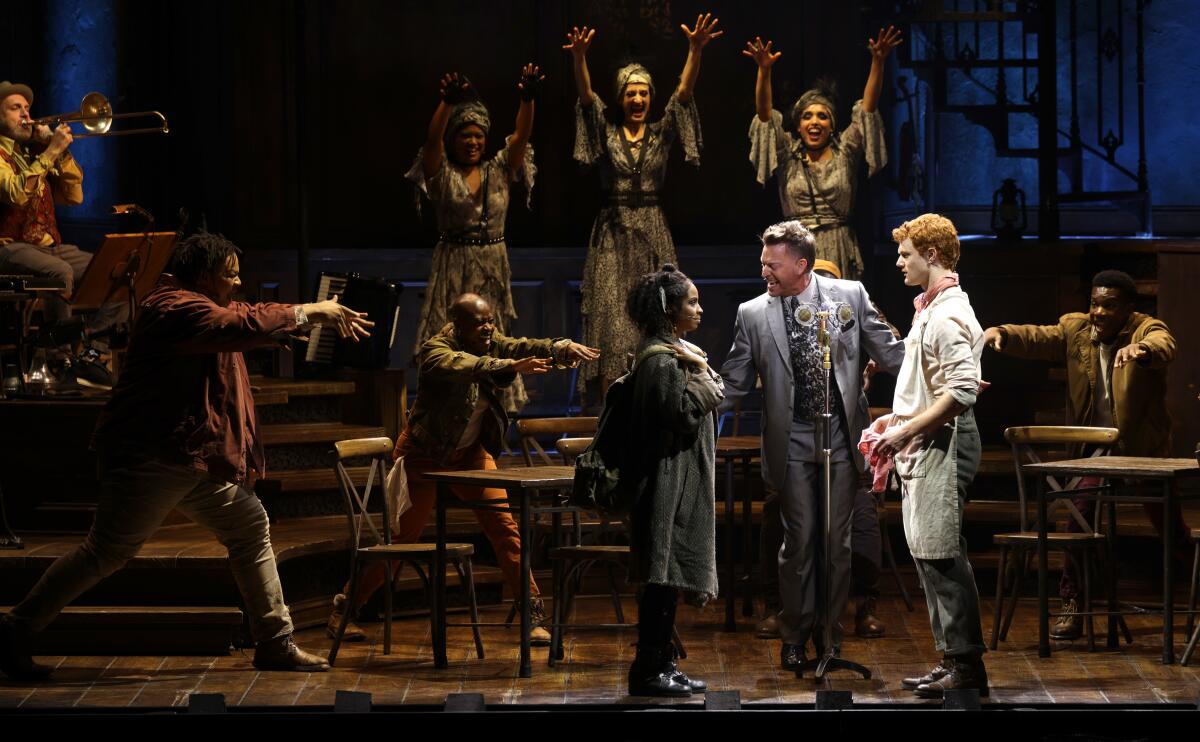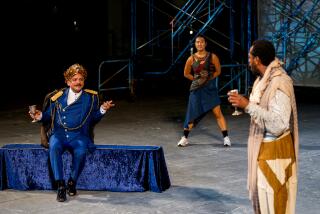A mesmerizing ‘Hadestown’ at the Ahmanson makes an old tale feel startlingly new

“Hadestown,” the 2019 Tony-winning musical reimagining the myth of Orpheus and Eurydice as a New Orleans-style folk opera, has arrived at the Ahmanson Theatre in smoldering fashion.
Born out of a concept album by Anaïs Mitchell, who wrote the book, lyrics and music, the show travels to the underworld and back again with liquified grace. Developed by Rachel Chavkin, the resourceful director who won a Tony for her staging, “Hadestown” achieves a fluidity of musical theater storytelling that makes an old tale seem startlingly new.
The story of Eurydice and Orpheus is presided over by Hermes (Levi Kreis, who won a Tony for playing Jerry Lee Lewis in “Million Dollar Quartet”). A mercurial character whose main role is master of ceremonies, Hermes entices us to once again resurrect this ancient tale of love and loss to see what fresh insights might be gained through another communal encounter.
The initial setting resembles a New Orleans speakeasy. Orpheus (Nicholas Barasch), a struggling songwriter whom Hermes has taken under his wing, is instantly smitten when Eurydice (Morgan Siobhan Green) walks into his life.
A ragamuffin looking for a meal, Eurydice receives instead a feast of affection that includes a proposition of marriage. “Is he always like this?” she asks. “Yes,” Hermes replies. And thus begins the saga of two young lovers whose attempt to hold on to the paradise they’ve briefly found in each other will lead them to the depths of hell.
Hades (Kevyn Morrow), the jealous tyrant of the underworld, and Persephone (Kimberly Marable), his wife who gets to return for half of every year to the land of the living, have equal prominence in Mitchell’s retelling. “Hadestown” directs a gimlet eye on the power imbalance in male-female relationships without sacrificing romantic mystery.
Persephone is under the thumb of Hades, who oppresses his understandably skittish wife with the same impunity that he uses to exploit his indentured workers. Eurydice gives up her happiness with Orpheus for a less impoverished afterlife in Hades.
The book can admittedly get blurry, but the emotional weight of the story comes though in the songwriting. Eurydice’s behavior is illuminated in a few lines from “Gone, I’m Gone”: “You can have your principles/When you’ve got a bellyful/But hunger has a way with you.” In “Hadestown,” the personal is never vacuumed-sealed from the political.
The stage is crowded with vibrant musical performers. The Fates (Belén Moyano, Bex Odorisio, Shea Renne), who provide this explanation of Eurydice’s actions, add an additional choral layer to a musical that is as much about interpretation as dramatization. A chorus of workers (Lindsey Hailes, Chibueze Ihuoma, Will Mann, Sydney Parra, Jamari Johnson Williams) in a Hades that’s conceived as an industrial wasteland provides powerful proletariat backup.
Rachel Hauck’s scenic design manages to convert a jazz club ambience into a Karl Marx-esque hellscape as the musical descends into the underworld. The surreal effect of this layout is enhanced by David Neumann‘s choreography, which keeps the mass of bodies in hypnotic motion.
Unfurling like a dream, “Hadestown” speaks most eloquently through its sultry jazz score, which not only won a Tony but also received a 2020 Grammy Award for musical theater album. The figures in this show are differentiated more by their distinctive musical essences than by their dialogue.
Barasch brandishes a piercing falsetto to impress upon us Orpheus’ innocent intensity. There are moments when his singing could be better modulated, but the character is clearly lost in the somber whirlwind of his own amorous thoughts.
Marable’s Persephone finds temporary rescue from her woes in honky-tonk. Green’s Eurydice has moodier riffs that recall the moonlit moments in the Duncan Sheik-Steven Sater score for “Spring Awakening.”
Comparisons between Broadway productions and touring shows are invidious, but this incarnation of “Hadestown” helped me understand just how instrumental the original Broadway company was to the show’s success. The casting, I now see, was unimprovable, and it took me some time to adjust to the new personnel.
The greatest loss is the absence of André De Shields, who won a Tony for his performance as Hermes. Kreis, who evokes a puckish Harry Connick Jr., is vocally electric. But De Shields, who performed the role as if he were conducting a gospel-inflected rite, set a more profound spiritual tone.
Morrow’s Hades is a seductive devil with a commanding voice, but I missed the deep Leonard Cohen resonances that rumbled out of Patrick Page‘s chest. Cohen is still hovering, but just not to the same penetrating degree.
For those who haven’t seen “Hadestown” in New York, there shouldn’t be any problem. The singing, especially in the group numbers, is irresistibly rousing.
Although the ending of the myth is well known, Mitchell’s inventive musical made me hope against hope that Orpheus would finally be able to safely retrieve his beloved from the land of the dead. To succeed, however, trust will have to overcome doubt.
Chavkin’s mesmerizing production lures us into a collective meditation on the locked-in fate of these characters. That they live again is a testament to the undying power of this collaborative art form.
'Hadestown'
Where: Ahmanson Theatre, 135 N. Grand Ave., L.A.
When: 8 p.m. Tuesdays-Fridays, 2 and 8 p.m. Saturdays, 1 and 6:30 p.m. Sundays. Ends May 29. (Call for exceptions)
Tickets: $35-$199 (subject to change)
Information: (213) 972-4400 or centertheatregroup.org
Running time: 2 hours, 30 minutes, with one intermission
COVID protocol: Proof of full vaccination is required. Masks are required at all times. (Check website for changes.)
“Hadestown” also runs Aug. 9-21 at Segerstrom Center for the Arts, 600 Town Center Drive, Costa Mesa; details at scfta.org
More to Read
The biggest entertainment stories
Get our big stories about Hollywood, film, television, music, arts, culture and more right in your inbox as soon as they publish.
You may occasionally receive promotional content from the Los Angeles Times.











